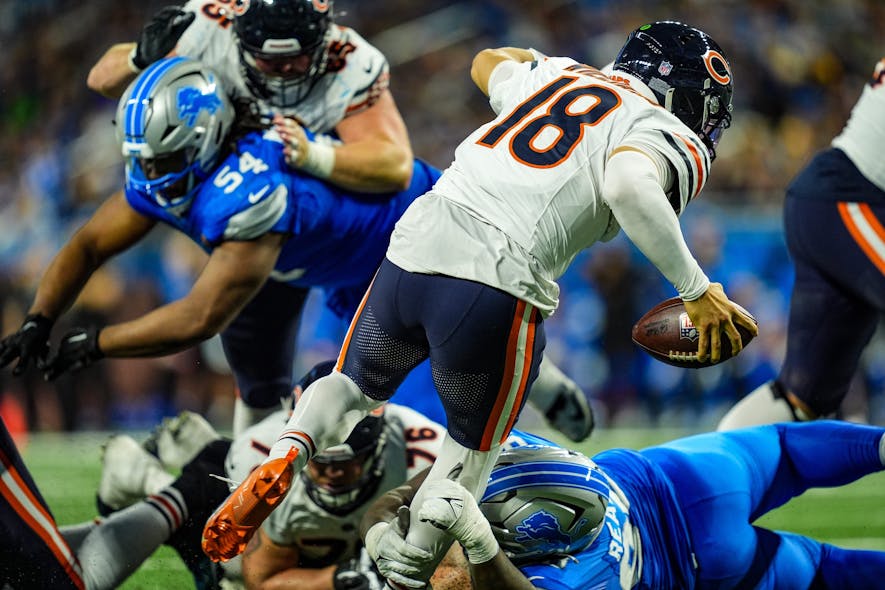A good sports betting column should be backed by a profitable gambler with a proven track record. It should offer picks generated by a sophisticated and conceptually sound model. Most importantly, it should treat the subject with the seriousness it warrants.
This is not that column.
Instead, this will be an off-beat look at the sports betting industry-- why Vegas keeps winning, why gambling advice is almost certainly not worth the money, and the structural reasons why even if a bettor were profitable, anything they wrote would be unlikely to make their readers net profitable, too.
While we're at it, we'll discuss ways to minimize Vegas' edge and make recreational betting more fun, explain how to gain an advantage in your office pick pools, preview games through an offbeat lens (with picks guaranteed to be no worse than chance), and tackle various other Odds and Ends along the way.
Tracking the Unders
In 2022 and 2023, mass-betting the unders was incredibly profitable over the first 6 weeks and essentially just broke even after that. I hypothesized this year that maybe all we needed to do to make a killing was to start our "mass-bet the unders" strategy earlier in the season.
Unders went 3-1 on Thursday and Friday, leading to hope that our luck would turn around for the holidays. Unfortunately, they went 4-7-1 on Sunday and Monday, leading to a 10.2% loss for the week. At $10 on each game and with all bets at (-110), we're now down $203.64 for the year. Our snowball strategy, by contrast, is "only" down $144.39. If this week was a full slate, it wouldn't even have enough left to bet a dollar per game. (But it's not a full slate, so it does.)
Checking In on That Bankroll
I've been saying all year that gambling can be a good way to add excitement to football. You're not likely to be profitable at gambling, but then again, I've never turned a profit at Netflix, either, and I still don't regret paying for it. In matters of entertainment, "profitability" is rarely the point.
With that said, it's important to know the true costs of what we're buying. I may not make money at Netflix, but I lose a predictable amount every month. This makes it trivially easy for me to decide if the benefit I receive is worth the cost. Gambling doesn't work like this; our true costs are often obscured, and we'll experience periods where our costs actually go negative (meaning we make money). This is... actually kind of a bad thing.
Every compulsive gambler can tell you about hot streaks where they were way, way up. The reason they keep gambling is that they know it's possible. If everyone just lost 10% of their wagers every week like clockwork, you wouldn't get people going bankrupt and ruining their lives because of a gambling addiction.
As the season draws to a close, I'd recommend looking back and tracking how much money you actually wagered and how much you are really up or down. If you're up, that's awesome, and congratulations. I'd caution against reading too much into it-- our pseudo-random number generator spends much of its life in the black, too.
If you're down... I'm sorry, though again, I'd caution reading too much into it. If you're picking against the spread, the long-run expectation is you will likely hover around 50% and lose about 4.5% of your total amount wagered to the vig.
But however you're doing, it's good to know and take stock. Certain products are restricted because they're potentially dangerous. As a society, we have decided they will only be available to people we believe are capable of making responsible choices about them. We don't sell guns, alcohol, or cigarettes to children. We don't let children drive or get married. And we don't let children gamble, either.
This isn't to say that guns, alcohol, cigarettes, driving, marriage, or gambling are necessarily bad. I'm not interested in moralizing; in fact, I happen to regularly take advantage of three vices on that list. I'm just saying it's good to make informed decisions. To do that, we need to know the true costs of the choices we make. Even if we're going to make the choices anyway.
If you find your gambling is starting to become problematic -- if you're losing more than you can afford or finding it difficult to set and maintain limits -- there are resources available to help, starting with the National Council on Problem Gambling.

